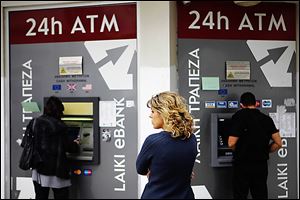
EDITORIAL
‘Blackmail’ in Cyprus
3/25/2013
A woman waits to use an ATM machine in Nicosia, Cyprus, last week. Cypriots withdrew cash out of fear of a proposed tax on bank deposits.
Cyprus’ parliament killed a proposal last week that lawmakers said would “blackmail” them into taxing the bank deposits of ordinary citizens. Now the tiny island is scrambling for a new way to come up with its share of a deal to bail out a banking sector that is drowning in bad debts.
Cyprus’ problems are different from those faced by Greece, Italy, Ireland, or Spain, and minuscule by comparison. The nation isn’t in crisis because of a real estate bubble, excessive social spending, or a stagnant industrial base. It’s in trouble largely because its big banks invested heavily in Greece, and were exposed when the Greek economy crashed.
With Cyprus’ two largest banks poised to fail, the European Union offered a $12.9 billion bailout package, on the condition that Cyprus raise $7.5 billion from a tax on bank deposits. This was a first: In previous bailouts of Ireland, Greece, and Spain, bank deposits were guaranteed.
Taxing small depositors was a major miscalculation, and probably unnecessary. There may be a lot of Cypriots with less than $130,000 in the bank, but their accounts constitute only a tiny fraction of total deposits.
Cypriots howled in rage and swamped automatic teller machines to try to withdraw their money before the parliament could approve the tax. Their ire sent chills down the backs of ordinary people from Athens to Dublin who feared for the safety of their bank accounts.
Members of the island’s parliament unanimously rejected the plan. Finance ministers of the 17-member Eurogroup decided not to insist on taxing deposits of less than $130,000.
That leaves Cyprus with the task of finding another way to raise its share of the bailout funding. The European Central Bank is threatening to stop providing emergency funds to Cyprus’ banks if a deal isn’t in place by today.
Athanasias Orphanides, a former governor of the Central Bank of Cyprus and a lecturer at the Massachusetts Institute of Technology, told Bloomberg News that “what we’re witnessing is the slow death of the European project.” He had harsh words for the bailout plan, saying the European Union was “blackmailing” Cyprus to “confiscate” money that belongs to depositors.
Mr. Orphanides blames Cyprus’ problems on the EU, which imposed a “haircut” on Greek debt. Before that, he says, Cyprus’ banking sector was stable.
Cyprus’ parliament now is considering two alternatives. One would nationalize pension funds, issue bonds against future natural gas revenues, and limit withdrawals to prevent bank runs.
The other would restructure the banking sector, including measures to prevent one of its largest banks from going bankrupt. The EU has not ruled out a tax on deposits of more than $130,000, perhaps because most of those deposits are held by foreigners — an estimated $30 billion by Russians alone — who seek to take advantage of Cyprus’ low taxes.
The fallout from the EU’s failed “blackmail” may be felt far beyond Cyprus, which accounts for only 0.02 percent of the EU economy. Large depositors will wonder whether it’s safe to keep their money in banks in European countries. What they decide could determine the future of the euro, and perhaps of the European Union itself.